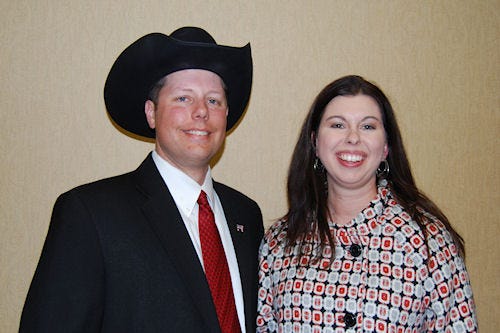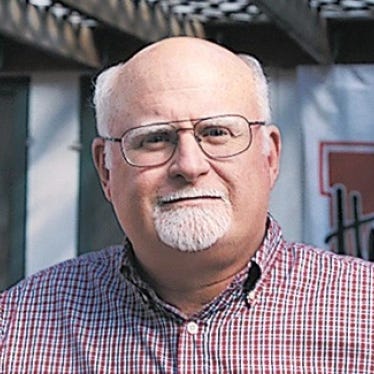
Just how influential are you? While few farmers and ranchers would claim they are, it's time to change that view, say Troy and Stacy Hadrick, a South Dakota ranch couple who spoke recently in Kearney at the annual Governor's Ag Conference.
The Hadricks have been all over the United States the past five years encouraging producers to tell their stories and to become advocates for agriculture. The couple inspired the crowd with their passion about agriculture and the pride they take in caring for their cattle and the quality, nutritional food they produce.

Troy and Stacy Hadrick
"Discover your influential power," Stacy challenged the audience. "Consumers do want to get to know us. But they don't understand agriculture."
The Hadricks recommended the "Three Ts" approach—talk, teach and touch.
First, start up a conversation when you're in an airplane, supermarket or anywhere you get the chance, Stacy said, then have your "30-second elevator speech" ready. "That's when you explain that you're a farmer or rancher, where you live and what you produce.
Be positive and make a good impression."
Second, education is key in changing perceptions. A myriad of activists groups, such as the Humane Society of the United States, PETA and the Sierra Club, promote vegetarianism and spread misinformation to consumers about today's modern agriculture and livestock production. And they are targeting kids in our schools.
The Hadricks use social media—Facebook, Twitter and blogging—very effectively to spread their message and they encourage other producers to do the same. "Use these tools, because those who oppose us are doing so."
For example, Troy filmed a YouTube video several years ago that showed him pouring out a bottle of Yellow Tail wine in a cattle pen, just after the Australian company making that wine donated $100,000 to HSUS. The video exploded across the Internet, prompting a company representative to call him and ultimately leading to the company backtracking and opting to support only animal welfare organizations whose sole purpose is animal welfare.
Know your audience and keep your message simple, Troy said. "Work with youth in the classroom. Don't underestimate your power in the classroom."
Don't overlook your local community, they explained. "You're wrong if you think everybody in your local community understands production agriculture. "
Finally, the touch factor means visiting with consumers, giving them your business card and telling them, "If you have questions, please give me a call."
They encourage farm women to go to their local meat counter and tell women shoppers that you're a mom, too, Stacy said. And take your children along to talk with consumers, too. "Just make the connection."
The message must come from all sectors of agriculture and all geographic regions of the country. "If we are a team we can combat the attacks," she added. "We can no longer let others tell our story."
The Hadricks website is www.advocatingforag.com. Their phone number in Vale, S.D., is 605-347-9128.
About the Author(s)
You May Also Like






